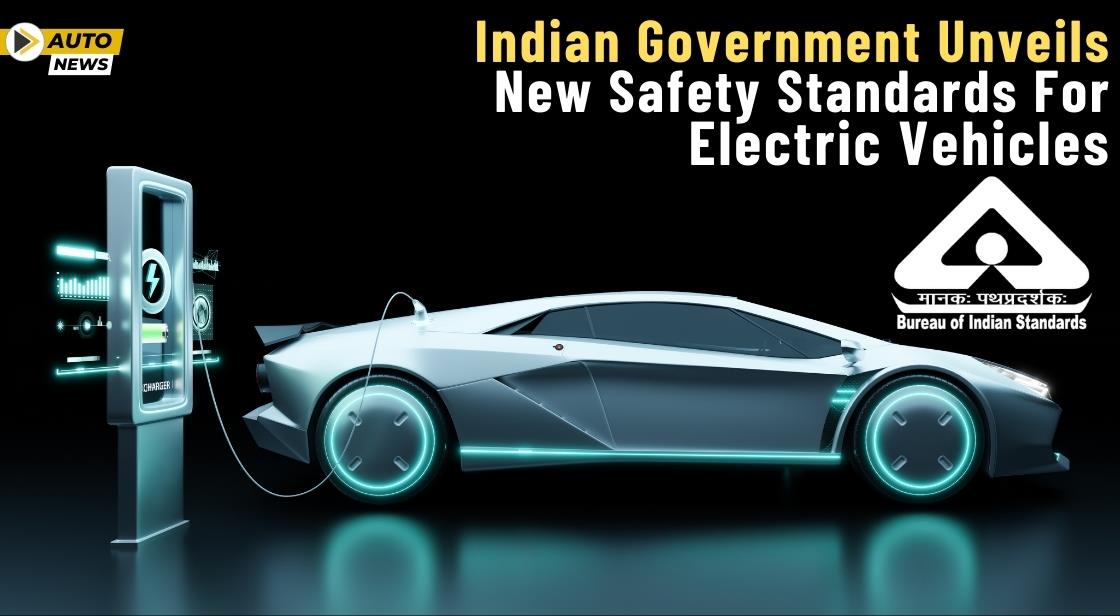Indian Government Unveils New Safety Standards for Electric Vehicles

News Synopsis
The Indian government has taken a significant leap forward in ensuring the safety and performance of electric vehicles (EVs) by introducing a comprehensive set of new standards. These standards encompass various EV categories, including two-wheelers (L), four-wheelers (M), and goods trucks (N).
Focus on Critical Components: Powertrain and Batteries
The Bureau of Indian Standards (BIS), the national body responsible for setting product quality standards, is spearheading this initiative. The two new standards, IS 18590: 2024 and IS 18606: 2024, place a strong emphasis on the critical components of EVs – the powertrain and batteries. These standards mandate that the powertrain meets rigorous safety requirements while also ensuring that batteries are both powerful and secure.
This move signifies a commitment to enhancing the overall safety of EVs in India and fostering public trust in this burgeoning technology.
Expanding Safety Standards Across the EV Ecosystem
The BIS isn't stopping there. The official statement from the Ministry of Consumer Affairs reveals that these new standards extend to electric cars, buses, and trucks. This comprehensive approach brings the total number of Indian Standards dedicated to EVs and their accessories, including charging systems, to a substantial 30.
Furthermore, recognizing the growing popularity of E-rickshaws and E-Karts, the BIS has addressed safety concerns in this segment with the introduction of IS 18294: 2023. This standard outlines specific safety requirements for E-rickshaws and E-Karts, encompassing everything from construction to functionality, to safeguard both drivers and passengers.
Driving a Sustainable Future with Safe and Efficient EVs
The Ministry of Consumer Affairs emphasizes that these new standards play a vital role in propelling India's transition towards a more sustainable, eco-friendly, and efficient transportation system. By prioritizing safety and performance, these regulations aim to create a more robust and reliable EV ecosystem that can confidently replace conventional fuel-based vehicles.
Standardization Efforts Extend to Charging Infrastructure
The Indian government recognizes the importance of a standardized charging infrastructure for seamless EV adoption. In response to concerns raised by industry stakeholders regarding a lack of consistency in charging infrastructure, the government is actively formulating a standardized charging protocol. This initiative aims to address interoperability issues and ensure a smooth and reliable charging experience for EV users across the country.
Recent Enhancements to Battery Testing Standards
It's important to note that this isn't the first step taken towards ensuring EV safety in India. Back in September 2022, the Ministry of Road Transport and Highways (MoRTH) implemented amendments to the existing EV battery testing standards – AIS-156 for two- and three-wheelers and AIS-038 (Revision 2) for four-wheelers. These amendments incorporated stricter safety requirements related to battery cells, management systems, on-board chargers, and thermal propagation to minimize fire risks.
These amendments, initially implemented in two phases between December 2022 and March 2023, have further bolstered the safety measures in place for EVs in India.
Conclusion
The Indian government's implementation of these comprehensive new standards signifies a multi-pronged approach to ensuring a safe and thriving Electric Vehicle (EV) ecosystem in the country.
-
Enhanced Public Confidence: By prioritizing rigorous safety measures for EVs and their core components, the government aims to build public trust and encourage wider adoption of this eco-friendly transportation alternative.
-
Standardization and Growth: The introduction of standardized charging protocols and a growing library of EV standards encompassing various vehicle categories paves the way for a more streamlined and reliable EV industry, fostering its growth and development.
-
Future-Proofing Sustainable Transportation: These regulations position India to embrace a cleaner and more sustainable transportation landscape. With safety concerns addressed and a robust infrastructure taking shape, EVs can confidently replace conventional fuel-based vehicles, contributing to a greener future.
The combined effect of these initiatives is expected to accelerate India's transition towards a sustainable transportation system powered by safe and efficient electric vehicles.









